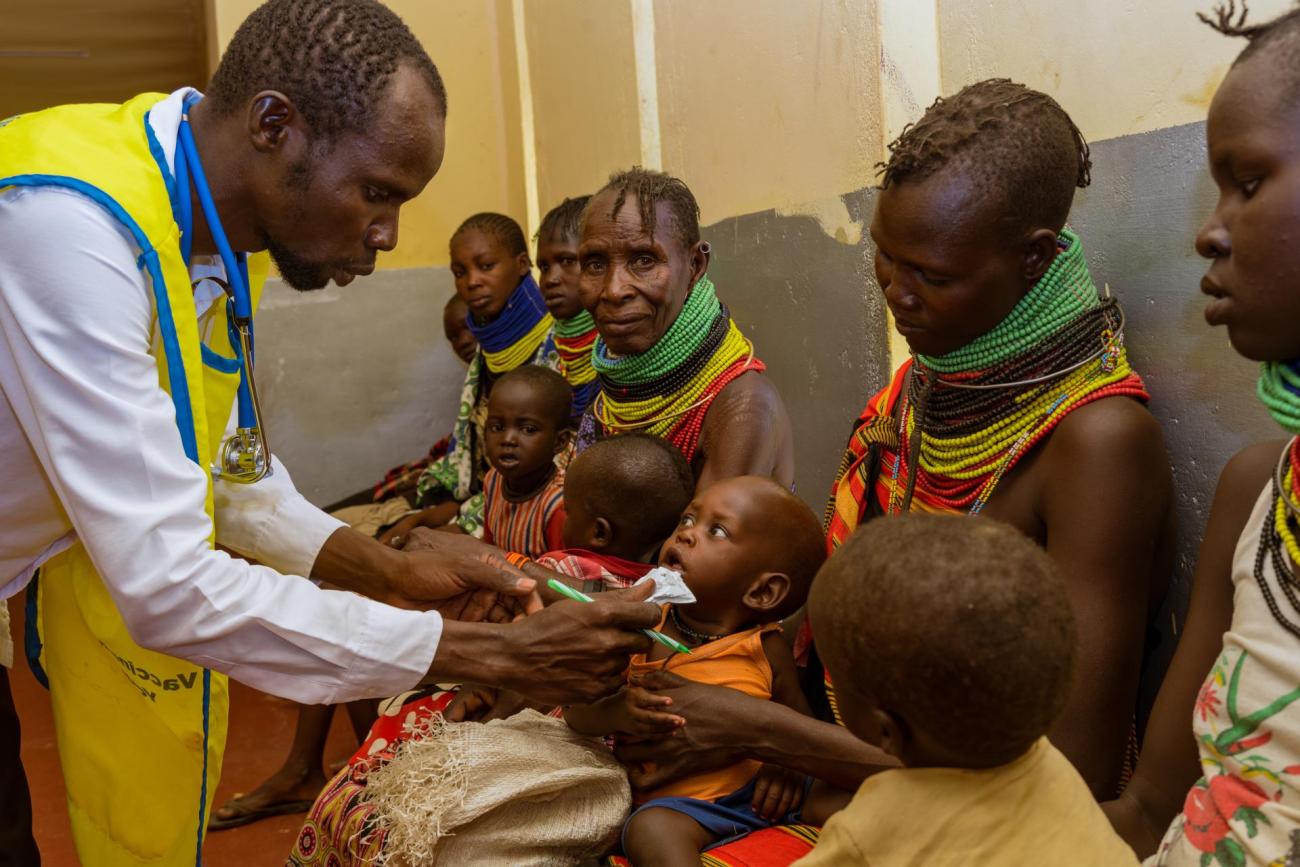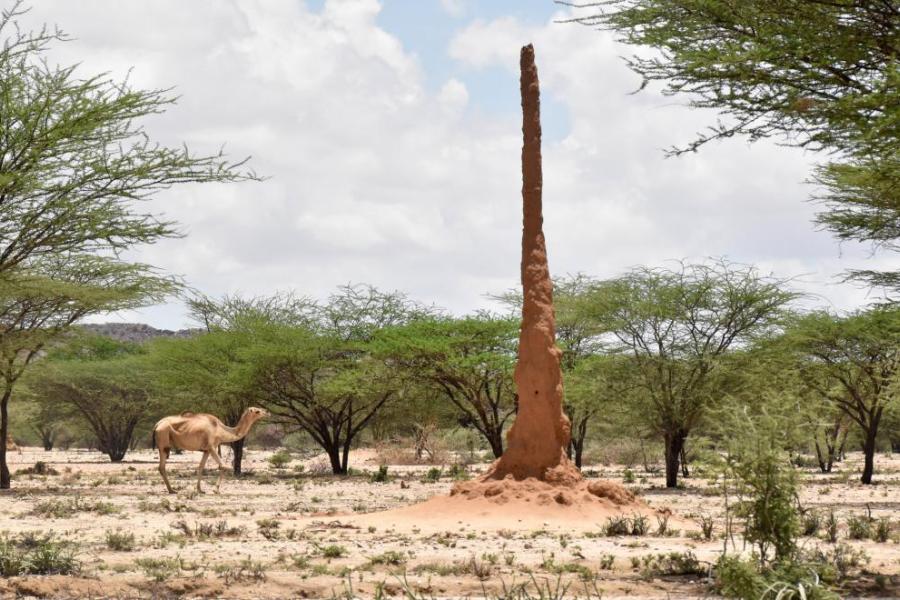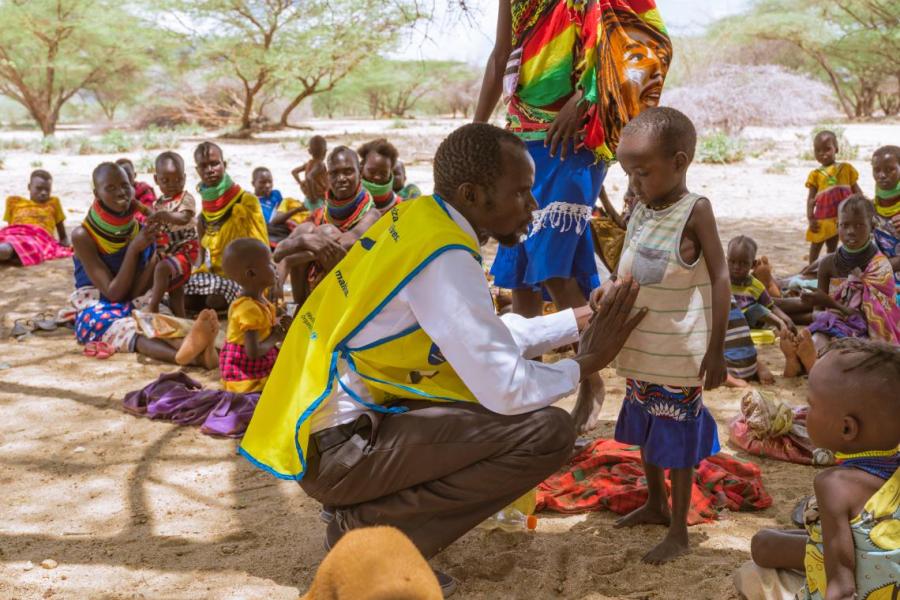In Turkana, Daniel treats climate-affected children for malnutrition

UNICEF is responding to the climate crisis, with support from USAID
Daniel Ereng is Nurse in Charge at Sopel Dispensary, Turkana County. He’s an energetic and passionate health care worker who has made it his personal mission in life to bring health and nutrition services to remote rural communities. Over the last three years, Kenya has been affected by the worst drought in decades, driven by climate change. Most of the families in Daniel’s area are pastoralists, who rely on their livestock for food, but very few of their animals have survived.
At Sopel Dispensary, Daniel starts his morning routine. A line of mothers and grandmothers have arrived, some the night before. They sit patiently in a row on the concrete bench that runs along the inside wall of the dispensary. Most of the mothers wear traditional Turkana dress – colourful robes and tall bead necklaces that emphasise their height. Almost without exception, they have brought with them young children suffering from malnutrition.
Moving along the line, Daniel measures the mid-upper arm circumference, weight and height of each child to determine their nutrition status. For those that are severely malnourished or wasted, he gives them sachet of ready-to-use therapeutic food (RUTF) – a kind of nutrient-dense peanut paste. “First, we tear the packet and ensure it is safe for the child,” he explains, offering the sachet to 18-month-old Epat Lodupur. “Then, we give it to the child to test her appetite. You can see that she’s consuming it very well. Congratulations, she’s doing well!”
The next child in line is an 11-month-old boy, Ekeripon Ekaal. Daniel takes the boy and his mother, Akure, to his office for a consultation. He removes the patent record from a shelf and enters Ekerip’s new measurements: an arm circumference of 12 cm, coloured yellow to show that he has moved out of high-risk phase, and weight of 7.3 kg. “I first saw Ekerip when he was just 6 months old,” Daniel recalls. “I did a screening and found that he had severe acute malnutrition. I’ve been doing follow ups since then. You can see the improvement – he’s almost ready to be discharged.”
After the consultation, Akure packs several sachets of RUTF in her bag, ready to begin the long walk back to her village. She is part of a large family: the fourth wife with five children of her own, of whom Ekerip is the youngest. Her husband used to be considered wealthy, due to the large number of livestock that he owned, but that was before the drought.
“We used to have so many animals – goats, sheep, camels and cows,” Akure explains. “But we lost over 40 animals during the drought. My husband migrated with the rest in search of pasture. Now we rely on just a few goats that survived. It’s not enough to feed my children. I feel that we’re not in a position to get the things we need to survive.”
Despite these challenges, Akure is grateful to Daniel and Sopel Dispensary. “I really appreciate the service of giving my child therapeutic food,” she adds. “At times, Ekerip develops diarrhoea. That’s why we come back to the health centre. But I’m happy that since I started this programme, he has been much healthier.”

Climate crisis
Along with the other arid and semi-arid land (ASAL) regions of Kenya, Turkana County has experienced three years of prolonged, severe drought followed recently by rains and flash floods. The landscape around Sopel remains mostly dry and sandy, but trees have returned to life and pasture is beginning to reappear on the previously barren ground. However, it will take families like Akure’s much longer to recover.
“The rains signal recovery but it’s a long haul. For this community to recover from drought, we’re talking about one and a half years,” Francis Kidake, Nutrition Specialist at UNICEF Kenya, explains. “That’s because we need to wait for the pasture and crops to grow, the condition of surviving animals to improve, and for them to reproduce, before people start getting milk and meat again. And many families have lost all their livestock. They have no resources and still need support to rebuild their lives. It’s a precarious situation.”
With support from USAID, UNICEF has provided RUTF to 219 health centres and 490 outreach sites across Turkana, to treat children with malnutrition. At Sopel Dispensary, UNICEF has also provided medicines and a fridge for storing vaccines, renovated a borehole to provide safe water to patients and health workers, and is supporting the health centre to do mobile outreach to remote villages in the area.
“We partnered with UNICEF to provide critical support such as water and sanitation, as well as therapeutic food for children and pregnant women," USAID Kenya Mission Director David Gosney says. "We are hoping to help communities overcome the impact of the drought, build resilience and for children to have their basic needs met such as nutrition, so that they can achieve their full potential here in Kenya.”

Outreach site
After the morning consultations, Daniel and his colleague pack their health and nutrition supplies into the back of small van and head out to one of their regular outreach sites. The van drives down dusty tracks through a flat plain, where children play outside round straw hats. One animal is doing well – tall termite mounds tower over people’s homes, reaching up into the blue sky. Local people use these mounds, along with acacia trees, as clues for where to dig to reach underground water.
“So, we’re going to an outreach site at a place called Lotesiro,” Daniel says. “This is where we offer our services to people in hard-to-reach areas. These outreaches have really been helping the community. Before, people had to walk all day to reach the dispensary and then stay overnight.”
At the outreach site, a group of women and children have congregated beneath a large tree. The health centre team arrives and starts setting up a mobile clinic, with boxes of medicine and vaccines, jerry cans for water, a height board and portable weighing scales. As they do this, the women break into spontaneous song. One tall woman in a black-and-green robe leads the refrain, while the rest clap their hands, chant back at her, and ululate. “Thank God for today,” they sing in the Turkana language.
Once the mobile clinic is set up, Daniel leads a talk on family planning and HIV prevention, then conducts individual check-ups for malnutrition with the children, treating or vaccinating them as needed. All the mothers have brought their children’s patient records, most of them covered in cardboard to protect the booklet.
“For the last three years, this has been one of the most drought affected areas,” Daniel observes. “This community had an additional challenge because the place is far away. Any time I received people from here in my facility, I really sympathised with them because of the distance they had to travel and the malnutrition they suffered. It hurts me when I hear that they only have one meal a day.”
However, despite the challenges, Daniel is determined to keep working for the children and families in his area. “Being a nurse, it’s my passion to serve the community and care for my patients,” he says.
This story first appeared in the Star newspaper





